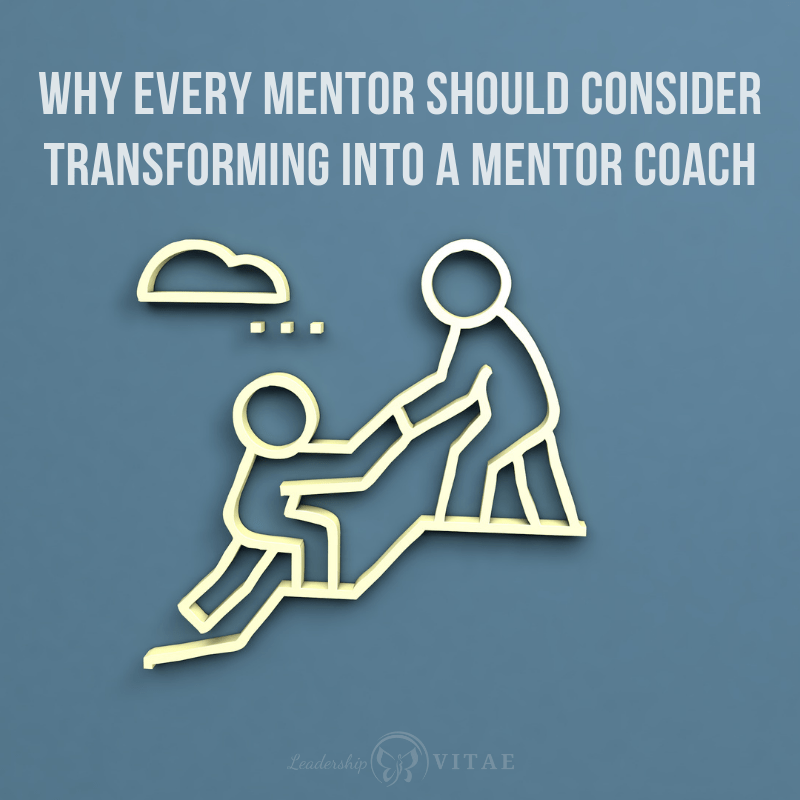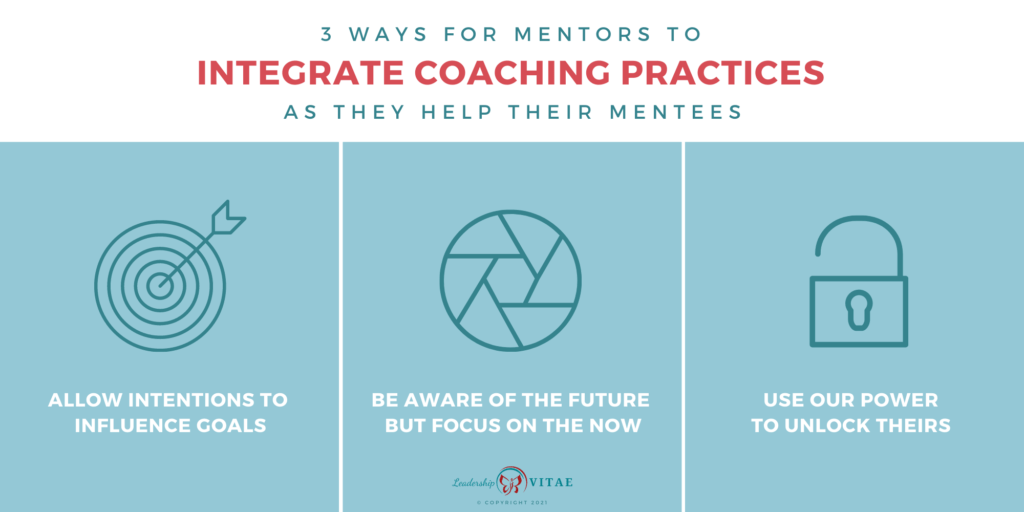
A lot has been written about the value of a mentor in helping us achieve our goals and realize our potential. For years following the release of Lean In, women the world over have looked for mentors as the “must have” for success.
Recently, there has also been growth in the field of career coaching. I believe there is correlation between the two.
While mentors are certainly helpful, there can be a gap in what mentors provide and what individuals find themselves needing as they navigate their lives and careers.
Hearing from mentees and fellow mentors, there is an opportunity for mentors to increase our effectiveness in helping people by integrating a coaching mindset to become mentor coaches.
What is the difference?
A mentor is traditionally someone more senior and outside of our organizational chain of command. They have experience in an area of interest and can help guide us as we pursue our goals. They have knowledge that can fast track our development, help us identify roadblocks, and provide insights based on their experience.
Coaches, on the other hand, are not subject matter experts. They are focused on the person and unlocking their potential. Coaches believe clients have the power inside them, and focus on what is going on right now that might be helping or hurting clients move forward in their direction of choice.
In short, mentors focus on the future and offer guidance to help someone get there. Coaches focus on the now and unlocking what is already inside a person to get where they want to go.
It may not sound very different as both want to help people and use their experience as a type of guide. Yet there are key distinctions.
The argument for blended mentor coaching
In coaching, there’s an expression: “after 3 sessions, all coaching is life coaching.” The reason is that we are one person. We are not a life self and work self, but a whole self. Coaches consider the full individual, while mentors tend to remain focused on work.
This is not universal. There are amazing mentors out there who help the whole person. Many understand it’s difficult to set and achieve career goals without considering life goals and impacts as well.
Covid has perpetually blurred any lines between work and life, so the need for helping the whole person has become even more important. If any preference remains for mentors to keep things “strictly professional” in the work environment, the great resignation is an indication of that impossibility.
As a mentor and coach there has been a common thread in conversations over the last two years. Individuals want help addressing their – frequently conflicting – work and home needs. When the job is not working for their lives, then it’s not working. There’s no way to help them without considering the whole person.
Coaching techniques to integrate
As mentors, we can integrate a few coaching concepts into our approach to better help the whole person. This is not to say we suddenly become a life coach but ignoring personal and home needs neglects a key element of what future success might look like.

1. Allow intentions to influence goals
While achieving a specific career goal may be the reason to engage a mentor, coaches begin with a focus on intentions.
With the fast pace of change, goals can become outdated. They tend to focus on the outcome, potentially at the expense of how we get there. Intentions allow the path to outcomes to evolve as we do, and as the world does.
Here is an example:
Specific Goal: I want to be a senior consultant in the next 2 years.
Intention: I want a role where I feel challenged and supported, am compensated sufficiently to start planning for and take care of a family, and have flexibility to be a present parent when the time comes.
It may be that the senior consultant role does allow the intention to be achieved. Depending on the role expectations, the underlying culture, and even leadership. However, strict pursuit of a goal without understanding intention may not allow the true needs of the individual to be met.
Understanding the underlying intention – what is driving the goal – is something every mentor can consider. Goals focus on external factors and achievement, while intentions are about how we live and our relationships with others. For the changing world we are living in, and the evolving nature of work, intentions can be the guide that influences our goals and helps evolve them over time.
2. Be aware of the future, but focus on the now
As a coach, we meet clients where they are today. We keep their overall intention or goal in mind but start each session in the now.
The world is changing rapidly. If we hold on tight to some future aspiration, needs or circumstances might have shifted. Anchoring in what is going on for the person right now allows us to better understand where they may need assistance that is helpful in the moment.
This is the individual’s journey, not ours. We want to understand in each conversation where they are on their journey, if the destination has changed, and what obstacles and opportunities may be present today.
3. Use our power to unlock theirs
Whether we are a coach, mentor, or both, we are a guide. It is not our journey. We are there to help an individual build a solid map and navigate their path successfully, while recognizing and adjusting to hazards and opportunities along the way.
In coaching, we believe every person has the power within them to find their way. It’s not about what we know, but about our ability to use what we know to unlock that power.
This means letting the mentee come up with solutions. We may have experience, but we can wait to share it. There are 1000 ways to solve a problem. We may know one or even ten. Their unique combination of skill and experience could bring one we hadn’t considered. Letting the mentee come up with their own solutions bolsters their confidence.
While mentors are often engaged because of their knowledge and experience, ultimately helping the mentee isn’t about what we know. It’s about what the mentee knows.
We all have the same purpose
As mentors and coaches, we are all here to help people. How we do it and what we focus on may be a little different. Ultimately, the intention is the same.
I’d argue that we can help more people when we bring a blended approach to mentoring. When our assistance is no longer about our specific experience in a given field or area, we can help anyone. And as a bonus, we get to learn too.
When we center the person, and allow their knowledge and ideas to come first, we may start to see our own opportunities and challenges differently.
The best mentors know it’s a reciprocal relationship, and an opportunity for learning on both sides of the table. That’s the power of mentoring that can be brought to coaching. Our ability to learn from clients and increase our awareness of what’s possible.
Whether we are a mentor, coach, or mentor coach, we can center the person, focus on the now, and ensure we remain aware of their intentions throughout their journey.
What other steps would you recommend to provide the best support as a mentor or mentor coach? Please share your thoughts in the comments for others to consider in their own practices.








